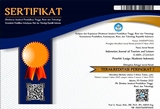Covid-19 Adaptive Tourism Attraction: Tourism Resilience Through CHSE Certification For Visiting Decision
Abstract
CHSE (Cleanliness, Health, Safety, and Environment) certification is implemented by the Indonesian government to restore tourism conditions post-pandemic. The research aim is to analyze tourists' visiting decisions to visit COVID-19 adaptive tourist attractions after the implementation of the CHSE certification policy as a strategy to restore tourism conditions post-pandemic. There were no studies that investigated the effect of CHSE implementation on West Sumatra tourist attractions such as Taman Margasatwa dan Budaya Kinantan (TMBK) and Taman Panorama Lobang Jepang (TPLJ). The descriptive research was carried out with a causal-associative quantitative approach using 100 respondents. The result revealed that: (1) The implementation of CHSE in COVID-19 is in the quite good category with a percentage of 50%. (2) Visiting decisions are in the quite good category with a percentage of 37.8%. (3) CHSE as a strategy to restore tourism conditions has an impact of 13.4% on visiting decisions. So, it is concluded that tourists decide to visit a COVID-19 adaptive tourist attraction, not solely because the tourist attraction has been CHSE certified. But 86.8% are influenced by other factors.
Keywords
Full Text:
PDFReferences
Augusty, F. (2013). Metode Penelitian Manajemen. Badan Penerbit Universitas Diponegoro.
Batubara, R. P., & Suci, W. (2022). Penerapan Sertifikat CHSE Terhadap Kepuasan Pengunjung di Devoyage Bogor. Altasia Jurnal Pariwisata Indonesia, 4(2), 92. https://doi.org/10.37253/altasia.v4i2.6807
CNN Indonesia. (2021). Poin-poin Aturan PPKM Darurat di 15 Daerah Luar Jawa-Bali. CNNIndonesia.Com.
Cook, K. (2014). Adapting Early Childhood Curriculum For Children With Special Needs. USA :Person.
Fernandes, N. (2020). Economic Effects of Coronavirus Outbreak (COVID-19) on the World Economy. SSRN Electronic Journal.
Hakim, R. N. (2021). Beda antara PSBB, PPKM Jawa-Bali, dan PPKM Mikro. Nasional.Kompas.Com.
Hassan, T. H., & Salem, A. E. (2021). The Importance of Safety and Security Measures at Sharm El Sheikh Airport and Their Impact on Travel Decisions after Restarting Aviation during the COVID-19 Outbreak. Sustainability, 13(9), 5216.
Hidayatullah, S., Windhyastiti, I., A., & E., & Rachmawati, I. K. (2021). Peran Cleanliness, Health , Safety Dan Environment Sustainability ( CHSE ) Terhadap Minat Orang Berkunjung Ke Destinasi Wisata Yang Ada Di Kota Batu Pasca Pandemic Covid 19. Seminar Nasional Kepariwisataan Sen2rita, 2(1), 161–170.
Kemenparekraf. (2020). Panduan Pelaksanaan Kebersihan, Kesehatan, Keselamatan, dan Kelestarian Lingkungan untuk Sektor Ekonomi Kreatif: Dalam Rangka Melaksanakan Protokol Kesehatan Bagi Masyarakat Produktif untuk Pencegahan dan Pengendalian Corona Virus Disease 2019 (COVID-19). Kementerian Pariwisata Dan Ekonomi Kreatif, 2019(Juli), 1–83.
Kemenparekraf. (2022). CHSE di 5 Destinasi Super Prioritas.
Kreatif, K. P. dan E. (2020). Panduan Pelaksanaan Kebersihan, Kesehatan, Keselamatan dan Kelestarian Lingkungan di Daya Tarik Wisata (p. 72 hal).
Magnini, V. P., & Zehrer, A. (2021). Subconscious influences on perceived cleanliness in hospitality settings. International Journal of Hospitality Management, 94(xxxx), 102761.
Ningsi, W., Wibowo, T. A., Perjuangan, J., &, & Cirebon, N. (2022). Penerapan Cleanliness, Health, Safety And Environmental Sustainability Pada Penyelenggaraan Kegiatan Wisata Di Keraton Kanoman Cirebon. Jurnal Ikraith-Huaniora, 6(2), 120–125.
Retno, D. (2016). Strategi Pengembangan Perilaku Adiptif Anak Tunagrahita Melalui Model Pembelajaran Langsung. JPK (Jurnal Pendidikan Khusus), 12.1, 51–66.
Rifai, M., Machfudz, M. E. A., & Saptadi, J. D. (2022). Penerapan Cleanliness, Health, Safety, Environment Sustainability (CHSE) di Desa Wisata Plosokuning Turi, Sleman. Media Publikasi Promosi Kesehatan Indonesia (MPPKI), 5(11), 1473–1479. https://doi.org/10.56338/mppki.v5i11.2936
Sandhubaya, G., Hidayatullah, S., & Roedjinandari, N. (2021). Study of Influence of Cleanliness, Health, Safety & Environment Sustainability on Tourist to Revisit the Beaches of Indonesia. International Journal of Advances in Scientific Research and Engineering, 07(10), 36–47. https://doi.org/10.31695/ijasre.2021.34090
Sugiyono. (2013). Metodelogi Penlitian Kuantitatif, Kualitatif Dan R&D. ALFABETA.
Veronika, R., Sasmita, & Ardiansyah. (2022). Pengaruh Sertifikasi CHSE Terhadap Strategi Peningkatan Tingkat Hunian Kamar Di Gammara Hotel Makassar. Home Journal: Hospitality and Gastronomy Research Journal, 4(2), 258–271.
WHO. (2020). Coronavirus Disease 2019 (COVID-19).
Wicaksono, A., & Suradi, S. (2020). Penerapan protokol chse di kawasan wisata kecamatan dlingo kabupaten bantul. Kepariwisataan: Jurnal Ilmiah, 15(2), 78–88.
Wulansari, N., Abrian, Y., & Adrian, A. (2020). The Effect of Consumer Behavior Factors on the Decision of Staying (Case Study of Bukittinggi 4 Star Hotel ) Progress in Social Science, Humanities and Education Research Symposium. Redwhite Press.
DOI: https://doi.org/10.36256/ijtl.v5i1.380
Refbacks
- There are currently no refbacks.
Copyright (c) 2024 Indonesian Journal of Tourism and Leisure

This work is licensed under a Creative Commons Attribution-NonCommercial-ShareAlike 4.0 International License.
Indonesian Journal of Tourism and Leisure Indexed and Archieved By:

Indonesian Journal of Tourism and Leisure is licensed under a Creative Commons Attribution-NonCommercial-ShareAlike 4.0 International License.













